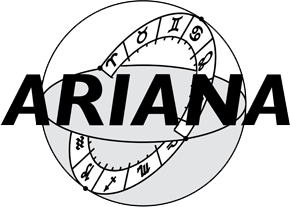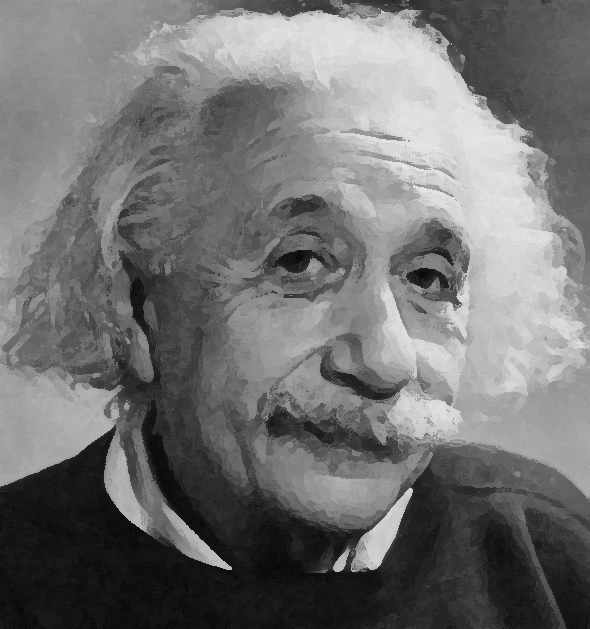Your Planets
Portraits of the Planets
Aspects between Planets
The planetary ages
The planetary families
Planets in Signs
The Planets in comics


“Einstein would be one of the greatest physics theorists of all time, even if he hadn’t written a single line about relativity”. Max Born, Nobel Prize in Physics.
.png)
.png)
.png)
 Albert Einstein was a deeply simple man who did not like honors. “He did nothing for merit, nothing for money, nothing to outclass others, and nothing to please people (1).” He never wore a medal or a ribbon and considered money to be the greatest evil of humanity. He was a man of duty, aware of his responsibility towards humanity and free from all hindrances. “Full of urbanity towards the humble, he could be only barely polite with the great of the world, or those classified as such (1).” He showed great reluctance to enter into very intimate personal relationships, which made him a loner.
Albert Einstein was a deeply simple man who did not like honors. “He did nothing for merit, nothing for money, nothing to outclass others, and nothing to please people (1).” He never wore a medal or a ribbon and considered money to be the greatest evil of humanity. He was a man of duty, aware of his responsibility towards humanity and free from all hindrances. “Full of urbanity towards the humble, he could be only barely polite with the great of the world, or those classified as such (1).” He showed great reluctance to enter into very intimate personal relationships, which made him a loner.
Born on 14/03/1879 (according to the Civil Registry at 11:30) in Ulm in Württemberg, Albert Einstein was neither a particularly good nor a particularly bad student. His great weakness was lack of memory. He admitted to having no special gift but admitted to being passionately curious. He had a remarkable intuition, full of finesse, which would also allow him to develop his “special theory of relativity” and his “generalized theory of relativity”.
Astrologically speaking Einstein’s birth chart is characterized by the following planetary hierarchy (cf. Manuel d’astrologie universelle. Richard Pellard):
▶ Joint Sun MC.
▶ Jupiter conjunct MC.
▶ Conjunct Uranus IC.
▶ Conjunct Mercury Dominant Sun
▶ Conjunct Saturn Dominant Sun
▶ Pluto sextile Sun and square Jupiter dominant (complete the ‘t’)
▶ Mars sextile Dominant sun and trine Pluto (No. 6)
▶ Venus conjunct Mercury-Saturn
▶ Moon trine Venus
▶ Aspectless Neptune (blind planet)
From the planetary hierarchy, it is easy to determine the R.E.T. families dominant which are, in order: rRtETPep. At the zodiac level it seems judicious to speak of a dominant Pisces-Aries, which highlights the “sense of opposites” in suitable phase and the “egalitarian phase” for maladjustment.
Level “Representation” from the R.E.T. largely dominates the chart of Albert Einstein: the ‘r’ with the angularities of Sun, Jupiter and Uranus, and the ‘R’ with the Sun and Mercury (note in passing the absence of Venus, a weak planet). This level “Representation” sensitizes the individual to what is simple, obvious, clear, unitary, certain, to speech and appearance. This family “hyper-rR” also allows authority, decisiveness, the will to achieve the objectives set and the awareness of its value(s).
Against all odds, he managed to impose his point of view and the certainty of the validity of his theories because it was not until 1919 that the English scientist Eddington brought the first experimental proof (during an eclipse of the sun) of the validity of Einsteinian relativity, whereas the discovery of special relativity dates back to 1905 and that of general relativity dates back to 1916.
This little employee of the Patent Office in Bern would undermine Newton’s absolute space and time, indisputable dogmas of physics at that time. His revolutionary ideas (Uranus) on the relativity of space and time would radically upset the scientific conservatism (Jupiter) of his time.
The genius of a man is not inscribed in his chart but if the individual possesses this genius, the chart allows us to see how it can be expressed. Einstein has among his first three dominants the planet Uranus. Certainly he was independent, original, unexpected and even eccentric but in no way authoritarian, dry, brittle or megalomaniac like Hitler, another infamous Uranian, was. For him, the uranian function was manifested by the imperious need to try to reduce the complex (‘T’) to the simple (‘R’), to describe with mastery and brilliance the laws which govern the universe, and to show in a unequivocally that energy and matter are closely linked through a simple equation: E = mc2.
In fact, in all of Einstein’s physical theories we find the constant presence of the ‘r’. For him “God doesn’t play dice” (which would make him a ‘T’ God) but he designed a logical, coherent and simple world. The validity of a scientific theory is judged, in his eyes, according to its simplicity and its clarity which is good ‘r’ and above all solar.
Some astrologers believe that Einstein devised the theory of relativity because of his zodiac dominance of Pisces. For some, one of the essential characteristics of Pisces is to be approximate, imprecise, vague and not absolute. In this sense one can in no way claim that Einsteinian relativity finds its source in the symbolism of Pisces because “The goal of the theory of relativity, as the great physicist Sommerfeld already said in the 1920s, is precisely to deal with what is not relative, it is to arrive at access to what is absolute, to what is invariant, to what does not depend on the point of view (2).” Relativity would therefore be above all of essence ‘r’ and above all solar without forgetting, however, that the sense of the relative among Pisces conceals above all its sense of the absolute and the essential: in this sense we can also say that relativity is of Pisces essence.
As a Uranian and thanks to the extinctive inhibitory force of Pisces, Einstein had the audacity and the genius “to turn off” the physical theories of his contemporaries to replace them with a revolutionary theory.
The theory of relativity does not deal with the “gravitation as a force but as an intrinsic curvature of space-time. If small bodies like the planets revolve around the Sun, it is not because of its attraction, but quite simply because, in the curved space-time surrounding the Sun, there are no lines of straight universes. A straight line is the shortest path from one point to another. In curved space-time, the movements of the planets are represented by geodesics, analogous to the shortest path (3).”
The geometrization of gravitation illustrates the reign of the structure of the Winter Signs and in particular that of Pisces.
Albert Einstein’s planetary hierarchy gives the Sun as the first dominant, which a priori might surprise some because he is considered above all an innovator and a revolutionary (Uranus).
For Einstein himself relativity is synonymous with invariance, absolute, clarity, certainty, logic, simplicity or evidence. Unquestionably the solar function plays a leading role in Einstein. It was he who allowed Planck’s quantum theory to take off and it was also he who propelled quantum physics to the fore (Uranus). Yet he vigorously opposed his probabilistic nature, so much so that quantum physicists considered him an old-fashioned conservative incapable of questioning himself (negative formula of the Sun).
Einstein had difficulty admitting that the world of the infinitely small is, by nature, indeterminate (Uncertainty principle of Heisenberg). He was convinced that the vague, the uncertain, the obscure, the complex (‘T’) which reigns at the level of the atom, was due above all to our imperfect knowledge more than to the very nature of this world. He was convinced that there must be hidden variables that would later help to clear up these enigmas (Uranus).
Einstein needed a transparent, determined and predictable universe. The ‘E’ (level of the concrete, of the practical experience, of the tangible) is not dominant in Albert Einstein and in fact these works have as their starting point the representation, the ideas and the organization that he makes of the world (‘r’ and ‘R’). “It takes as its starting point, not the experimental data (‘E’), but the fundamental theories (‘R’) which are at its disposal… (3)”. In fact Einstein is not at all an empiricist but a speculative whose theories are not verified until many years later.
‘R’: “I am a model, I pose for artists”
Taxing Albert Einstein for oversimplifying or lacking critical thinking (negative formula of the ‘r’) would be a big mistake. More than any other Einstein was aware that one day or another the theory of relativity would be superseded and supplemented by a theory encompassing both that of Newton and his own. Capable of self-criticism, he was deeply curious and lucid (‘t’).
When asked about his “genius”, He answered: “I have no special gift; all I have is that I am passionately curious.” And it is true that all his research is based on this deep curiosity, this taste for analysis and research (‘t’).
The ‘R’ is also dominant in Einstein (dominant Sun and sub-dominant Mercury). The sense of humor (Mercury) of this scholar is well known to everyone and one day he was on a train, a passenger who had not recognized him asked him what he did for a living, he replied: “I’m a model, I pose for artists (‘R’)”. If he knew how to impose himself by his open-mindedness, his casualness and his playful spirit, Einstein did not like to bind privileged emotional ties (weakness of Venus) with his interlocutors.
Contrary to what the dominant ‘R’ might suggest, spontaneous sociability was not Einstein’s forte; he was mostly solitary. This character trait is probably due to the extinctive inhibition of the Sign of Pisces where his dominant Sun is, which means that in the end the main thing for Einstein is to devote himself to the realization of his ideal. The proximity of Saturn at its natal Sun (broad conjunction) and its native Mercury (close conjunction) must also have participated in this character trait, allowing him to take a step back, distance from his social image and the superficial of worldly dialogues.
We have so far spoken very little of the planet Jupiter and yet this is the second dominant of Albert Einstein’s chart, after the Sun but before Uranus. Einstein seems to have had difficulty fully living this planetary function. He had no respect for the world of finance and considered money (Jupiter) to be the greatest evil of humanity. He was totally involved in the ideals he pursued (Soleil); he was nonconformist and original (Uranus) but he did nothing for merit, nothing to be recognized or to fit in with the rules of life in society (Jupiter).
Einstein knew that to get a chair at the University, it was far better to get a doctorate. Yet to his friend Besso he declared: “I will not seek a doctorate… All this comedy ends up boring me.”
This rejection of Jupiter is probably due to the opposition of Uranus and at square of Pluto but also to the historical context in which he lived. Yet if Einstein lived most of his life as an anti-Jupiterian (attributes “Subject”), he became, in spite of himself, an official guide, a moral and social reference or a judge (Jupiter). Even his colleagues claimed that as he grew older he had become conservative and conformist. Above all, I think that Albert Einstein was trying to impose his unitary vision (‘r’) of physics.
The last years of his life were devoted to research on the “unitary theories of gravitation and electromagnetism”. Unfortunately, time ran out for Einstein and success ceased to smile on the illustrious physicist.
A final word on the subject of Albert Einstein. Contrary to certain rumors that run among fellow astrologers; Einstein was anything but neptunian. Besides, this planet is the planet “blind” or feral of the chart of the scholar.
The year 1905 must be considered the year in which Einstein made his greatest discoveries. First there was the article “very revolutionary on light quanta”, then his doctoral thesis and his article on the “Brownian movement” and finally the article “On the electrodynamics of bodies in motion” or Special Relativity. However during this same year, Einstein lived a transit by conjunction of Neptune on his Ascendant. I leave it to you to draw the conclusions of this transit, with regard to the scientific career of the physicist…
▶ (1) Albert Einstein. Seghers Editions.
▶ (2) L’Espace et le Temps Aujourd’hui. J-M Levy-Leblond. Editions du Seuil.
▶ (3) Le monde quantique. Michael Paty. Editions du Seuil
▶ NB: The work that I was mainly inspired by is that of the physicist Banesh Hoffman at Éditions du Seuil: Albert Einstein, creator and rebel.
Article published in issue No. 11 of the Fil d’ARIANA (April 1999).
A quote, wrongly attributed to Albert Einstein, has been circulating in astrological circles for decades. There she is:
“Astrology is a science in itself, illuminating. I learned a lot from her and I owe her a lot. Geophysical knowledge highlights the power of stars and planets on Earth’s destiny. In turn, in a certain sense, astrology reinforces it. This is why it is a kind of elixir of life for humanity.”
This quote is wrong. In reality, Einstein was suffering from anti-astrologism like most scientists. In fact, in 1951, in his introduction to the biography and correspondence of Kepler published by Carola Baumgardt, he wrote: “astrology is an internal enemy neutralized but not completely dead.”
Is death relative or absolute? Can one be a quarter, half, three quarters dead? No. Either you’re dead or you’re not, unless you believe in the living dead, which doesn’t give a shit about a rationalist physicist.
Einstein is dead and astrology is still alive.

Le petit livre des Poissons
par
49 pages. Illustrations en couleur.
Ce livre présente et explique les trois zodiaques : celui du décor des constellations, celui de l’astrologie traditionnelle basé sur les Quatre Éléments symboliques (Feu, Terre, Air & Eau) et celui de l’astrologie naturelle basé sur les phénomènes astronomiques objectifs.
Interprétation des Poissons selon la symbolique classique et selon ses réflexes dans le zodiaque naturel (force, vitesse, équilibre) ; interprétation des Poissons en fonction des planètes dominantes ; le Signe solaire & le Signe Ascendant.
Téléchargez-le dès maintenant dans notre boutique